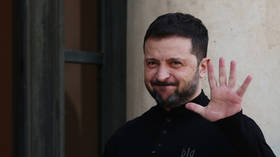It’s fine to protect terrorists’ privacy – but then you have no one to blame when they blow you up

Europe now has to be honest with itself – with enemies in its midst, it can either sacrifice some of the legal rights it holds so dear, or tolerate the deaths of innocents as a price worth paying for keeping its principles.
The decision to pay €500 to Salah Abdeslam, the last man alive of the Paris attackers who killed 131 people in November 2015, as compensation for illegal 24/7 surveillance of his French prison cell since his arrest, has provoked widespread outrage. To many he is lucky to have avoided a public execution, a luxury not afforded to his jihadist gang’s victims, never mind safeguarding his right to use the toilet without being watched.
But to advocates of the rule of law this is something of a pedantic triumph to the situation – according to the present legal system even a convicted man enjoys the same constitutional right to privacy. No one is below the law.
Also on rt.com Rule of law gone amok? French court awards €500 compensation to Paris terroristOther than as a lightning rod of public anger the incident is trivial – withholding the money wouldn’t have brought those mowed down in the Bataclan back – but it does illustrate the tightrope authorities in Europe have to walk in regards to those who pose a danger to society.
The French, Germans or Brits say they do not want American Patriot Act-style legislation that would give security agencies untrammeled power to snoop on its citizens, whether they are just suspects or have already been convicted of some offense. European voices were some of the most outraged at the Snowden revelations that exposed the true spying capacities of the NSA, while a Guantanamo would be politically untenable for any government on the continent. Extra-judicial practices are unacceptable, and the fundamental principles are not violated – at least not openly.
Europe’s law enforcement apparently works with one hand behind its back – having to monitor thousands of people from a distance, but unable to stop them from joining Islamist causes abroad, or freely coming back, incapable of curtailing their radical activities at home until they explicitly violate the law, not empowered to step in before something bad happens.
Also on rt.com Inevitable threat? Strasbourg gunman was on terror watch list, had grenades at homeWhich makes it rich when the same public voices and media complain about authorities not doing enough, particularly in cases where the future terrorist was known to them. Most recently illustrated last month, when MI5 had to explain to relatives of victims of the 2017 London Bridge attack why it did not stop the deadly vehicular assault, despite being aware of the chief perpetrator for several years. But what was MI5 supposed to do – snatch him off the street and take him to a “black site,” or try to convict him and thousands of other potential jihadists through a closed court without sufficient evidence?
Despite public assurances that all violence is unacceptable it often appears that Europe has made its unspoken peace with its own laxness, as repeated attacks, from Charlie Hebdo to Nice to Manchester Arena to Las Ramblas, have not resulted in any open change in approach. Or perhaps authorities believe that as much as can be done is already being done behind the scenes – UK Home Secretary Sajid Javid boasted in May that 19 major terrorist attacks had been foiled in the past two years alone, and hundreds more prevented before they took shape.
Also on rt.com UK home secretary wants closed hearing to keep MI5 security breaches secret from public and mediaBut no one can promise that even this is the new baseline. Javid himself warned that the frequency of the plots is growing, so unless there has been a breakthrough in prevention, there is no reason to assume that there won’t be future attacks of the same magnitude, or ones designed to top them for greater attention.
More fundamentally, the problem of which terrorism is only the sharp edge has not been resolved. There are still tens of millions of poorly integrated migrants living deprived lives in the suburbs of the continent’s large cities, and with migration their proportion will only grow. Most of them will not buy chemicals and nails online, but they will bring a host of social problems.
So, Europe has not just to ask itself whether privacy in prisons is sacred. But if it can abandon freedom of worship by banning religious schools and mosques that teach anti-Western ideologies. If it should target people and neighborhoods on the basis of race and religion. If migrants are to be accepted no-questions-asked, even if there are violent radicals among them. If it must maintain the liberal justice system that saw Abdeslam and his friends getting only fines and months-long sentences for drug dealing and robberies, or the social security that gave him thousands of euro in benefits that he used to finance the purchase of guns and peroxide.
How much longer can Europe put off these questions, pretending that nothing has changed in its cozy little Old World?
By Igor Ogorodnev
Igor Ogorodnev is a Russian-British journalist, who has worked at RT since 2007 as a correspondent, editor and writer.
The statements, views and opinions expressed in this column are solely those of the author and do not necessarily represent those of RT.















